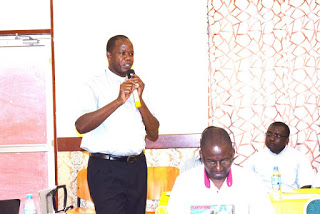TANZANIA: AMECEA Sec General advocates for Clear Management and Financial Policies in the Church institutions

AMECEA Secretary General Very Rev. Fr. Ferdinand Lugonzo has urged the Catholic Institutions to set clear management policies and financial guidelines for the smooth running of diocesan office activities.

In his presentation on ‘Church Management’ Topic during the Training on Financial Management for Diocesan Executives of Tanzania Episcopal Conference (TEC), held in Dar es Salaam from 5th -10th February, 2018, having put emphasis on Administration of Church Properties and Resources Fr. Lugonzo encouraged all who are involved in the Administration to be guided by clear policies and guidelines to enable them run the activities of the institution smoothly.
“The main objective of the Church is to evangelize, but still we need both human and financial resources to meet the goals set,” he said adding that, “in managing the Church’s resources, we must involve the right people with right skills; we need professionals and experts for a particular activity to succeed,” emphasized Fr. Lugonzo.
He advised the National secretariat to support diocesan offices to be professional with clear vision right from the national level, to the Dioceses and to the parishes adding that, the financial guidelines at the national offices should also be replicated at the diocesan and parish level.
The Secretary General insisted on collaboration among national offices, Diocesan and Parishoffices and all involved as effective means of achieving the goals set by the ministry. “This is aided by suitable structures that can provide the necessary support and continuity for the work of individuals and groups,” he said.
Making reference to Vatican II document Lumen Gentium No. 30, Fr. Lugonzo said that it is emphasized in the document that, the sacred pastors should always remember that they are not instituted by Christ to undertake by themselves alone the Church’s whole mission of salvation to the world but to acknowledge the ministries and charisms of the lay faithful, so that they may co-operate in the common task.
“Leadership within the Church is therefore responsible for identifying individual charisms, nurturing and supporting them, and facilitating participation in the common task,” he said.
By Sarah Pelaji, Dar es Salaam


